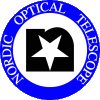
The Nordic Optical TelescopeThe Nordic Optical Telescope (NOT) is a 2.56-m telescope located at the Spanish "Roque de los Muchachos" Observatory (ORM), La Palma, Canarias, Spain. The owners of the telescope and the organization behind the telescope are Aarhus University (AU), Denmark and the University of Turku (UTU), Finland. The shared ownership is regulated via an agreement concerning the ownership and operations of the Nordic Optical Telescope signed by AU and UTU on 1 April 2019. UTU is the legal entity behind the telescope and its facilities located at the ORM, and AU is the legal entity behind the organizational structure (including hiring of staff, and operations and maintenance of the telescope and instrumentation). The NOT is at present operating under an agreement between the five Nordic partner universities that aim at ensuring access to the facility and operating the telescope in the period 2020-2030. The telescope is a facility exclusively intended for scientific research and education with the aim of studying the Universe from Solar System, stars and exoplanets to galaxies, black holes and other compact objects, cosmology and the Big Bang. The objective of the organization behind NOT is to provide observing time and access to high quality scientific instrumentation for the participating partners primarily in the Nordic countries.
The NOT – from past to futureA project to build a Nordic Telescope was first proposed in 1980 by Profs. Bengt Strömgren and Anders Reiz. A feasibility study by Torben Andersen was completed in July 1981 and this led to forming a Nordic Optical Telescope Committee with the task of presenting a project study. Funding for initial project activities, notably site testing and progress on detailed design, was provided in early 1983 by the Swedish and Danish Natural Science Research Councils. The Nordic Optical Telescope (NOT) Scientific Association (NOTSA) was founded in 1984 to construct and operate a 2.5m Nordic telescope for observations at optical and infrared wavelengths from the Spanish Observatorio del Roque de los Muchachos, La Palma, Canarias, Spain. After construction and testing, the telescope was inaugurated in 1989, and regular observations started in 1990. Instrumentation upgrades have been part of the strategy since the beginning and work has been done over the years to streamline the telescope, instrument and data flow operations so as to improve the efficiency, flexibility and reliability of the operations. Among the many scientific results produced over the many years of operation are long-term monitoring of active stars and rapid response to events in the emerging fields of Gamma-Ray Bursts and exoplanets. A programme of training activities, including an expanded Research Student programme, has also been developed over the past decade. The original concept for the NOT was an independent, general facility for observational projects by Nordic astronomers. It continues to be the strategy for NOT to offer observing time through open peer review calls focused on Nordic astronomers. However operations and the development of new instrumentation is now focused on making NOT a specialised tool with emphasis on scientific fields where it can optimally serve the best Nordic science teams. A plan has been implemented to equip the NOT with a single new, permanent focal-plane instrument - the so-called NOT Transient Explorer (NTE) - offering optical and NIR imaging and spectroscopy and modelled on the highly successful X-shooter at the ESO Very Large Telescope (VLT), as well as upgrade the FIES instrument to yield high-precision spectroscopy. The aim is to make NOT a powerful tool for the study of a wide range of transient and variable astrophysical sources in the coming decade. This objective is the basis for the AU and UTU, in partnership with other Nordic universities, to take over the telescope and the organization as of the 1st of November 2019, with the aim of continuing operation of this first class facility for the benefit of Nordic research scientists and students.
The NOT Council members |